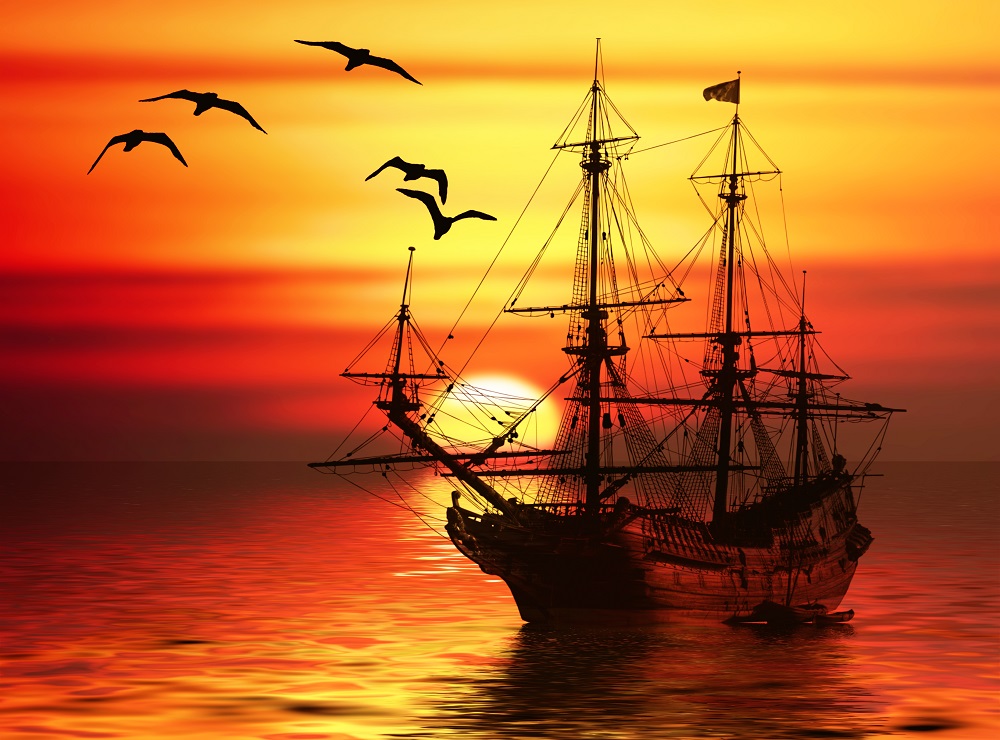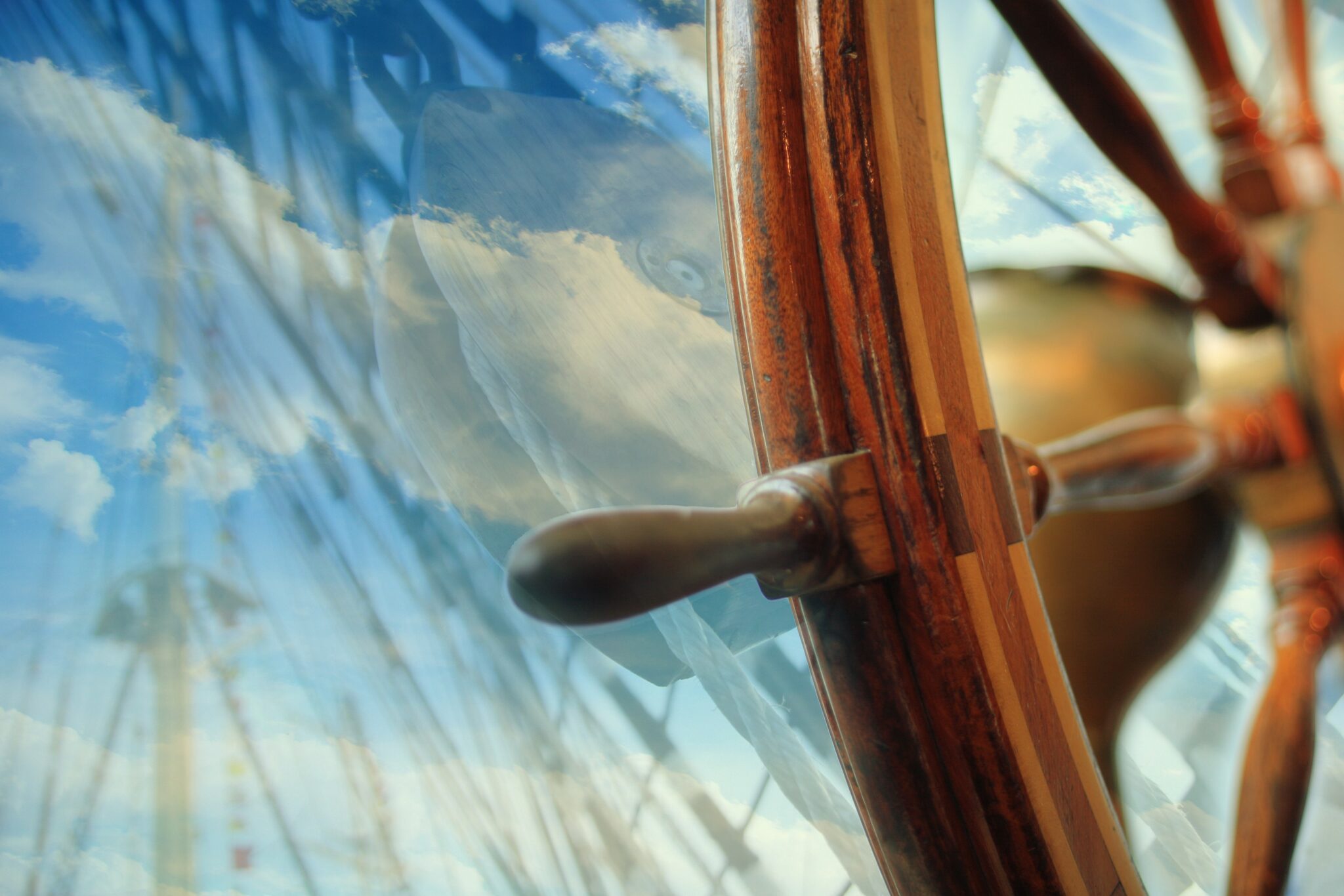From 1680 to 1725, the so-called “Golden Age of Piracy” put the world’s trade at risk. This was the moment in history when pirate sailing became so flagrant that the most talented pirates the world had ever seen pillaged numerous trading ships carrying vast quantities of treasure and valuable goods. During that period, famed pirate captains like Blackbeard, Calico Jack, and Black Bart rose to prominence, acclaimed for their naval military forces as well as for victoriously overcoming merchant ships.
One of the things that made them intimidating were their renowned flagships, expertly designed not only to survive the roaring waves of the world’s roughest oceans but also to defeat their naval foes through the barrels of their formidable cannons. These types of pirate ships were so terrifying that they reminded you of Captain Jack Sparrow’s legendary pirates of the Caribbean boat, Black Pearl. So, set sail and take a look back at some of the most dreadful pirate ships in history.

Queen Anne’s Revenge
There is no doubt that the famous Blackbeard flagship, Queen Anne’s Revenge, was one of the most famous pirate ships of all time. In November 1717, Captain Benjamin Hornigold captured a 300-ton frigate in the eastern Caribbean, originally a slave ship named Le Concorde de Nantes. Captain Pirate Hornigold gave this ship to his first mate, Edward Teach – Blackbeard. He renamed the pirate boat “Queen Anne’s Revenge”, upgraded her, armed with 40 cannons, and carried 150 pirates. With Queen Anne’s Revenge, Blackbeard performed one of his famous acts. He blocked the city of Charleston and captured eight valuable vessels. Queen Anne’s Revenge was also famous for its sea-battle victory over a powerful warship, His (or Her) Majesty’s Ship “Scarborough.”
In June 1718, the Queen Anne’s Revenge hit a sandbar right off North Carolina, leading the crew to abandon the ship. Captain Blackbeard took the opportunity to make off with all the loot and a select few of his favorite pirates, leaving the others to fend for themselves. Many people believed that the famous pirate deliberately scuttled his pirate sailing ship because he went legit after that. He was apparently a privateer, a robber who worked for the state for a while. Privateers used to receive the so-called Letter of Marque and Reprisal, government permission allowing one to assault and seize hostile vessels. Since the punishment for piracy was immediate death, hanging such a letter could save sailors from certain death, since their home nation treated them as prisoners of war.
Despite that, Blackbeard returned to his old ways, and on November 22, 1718, pirate hunters killed him in a pitched battle right off North Carolina. The wreckage was discovered in 1996.
Blackbeard was one of the most devious and ruthless pirates who tormented the waters of the Atlantic and the Caribbean. Although his pirate sailing adventures might not have extended for decades, Edward Teach still made his way into pirate history.
Kingston
Another famous pirate ship from that time was Kingston. A former merchant ship captured by John “Calico Jack” Rackham. His nickname originated because of his taste in brightly colored calico cloth. He started his career as the quartermaster of the renowned pirate captain Charles Vane.
During one of many battles, the ship’s crew declared Captain Vane a coward and voted Calico Jack as the new captain. The new crew marooned Captain Vane and his supporters ashore. Now, as the captain, he started attacking small vessels around Jamaica. One of the bigger prizes was the ship Kingston. Calico Jack made it his flagship. Unfortunately for him, he took Kingston within sight of Port Royal, where outraged merchants outfitted bounty hunters to go after him. They caught up with him while his ships and the Kingston dropped their anchors at Isla de Los Pinos, right off Cuba. Rackham and most of his men were onshore at the time, escaping capture by hiding in the woods. Unfortunately, they lost all their pirate ships and rich trophies.
Rackham and his men made their way to Nassau, where they appeared before Governor Rogers and asked for a royal pardon, claiming that Vane had forced them to become pirates. Rogers hated Vane and chose to believe them, granting them a pardon and allowing them to stay. Their time as honest men, however, did not last long. Soon after returning to Nassau, they were declared pirates again and all sentenced to die.
An interesting story about this ship is that it had two female pirates on the crew, both cross-dressed as men. Anne Bonny, probably the most famous female pirate, was the captain’s lover and he took Mary Read during one of the attacks as part of the merchant ship crew.
Royal Fortune
Bartholomew Roberts, one of the most successful pirate captains, also known as Black Bart, holds the record for most ships successfully plundered. Except for this record, he was also known for being a cruel, cold-hearted pirate. Once, he burned 80 slaves inside a captured slave ship because he considered it a waste of time to unshackle those people.
In 1720, he captured a French ship and renamed it Royal Fortune. It was the same name that he used for every ship he captured. The refitted ship had 42 cannons, and the new crew consisted of 157 men. This armament made it a dangerous opponent for any Royal Navy ship in the area. Royal Fortune sailed to Africa looking to increase profits in slave trading.
After arriving in Africa, Roberts captured a ship named Onslow, which he renamed Royal Fortune, after abandoning his old pirate sailing ship due to a rotting hull. Captain Roberts’ fame ended in 1722 when the navy vessel Swallow attacked the last Royal Fortune. The ship was anchored near Cape Lopez when the fight broke out. Captain Roberts died early in the battle. The Royal Navy successfully captured the Royal Fortune and a few other smaller ships from the Black Bart fleet. His death shocked many merchants and the Royal Navy as he was considered very dangerous and practically invincible.

Revenge
Stede Bonnet’s career as the “Gentleman Pirate” may represent the worst midlife crisis on record. Aside from being educated, he was also a retired major and owner of a plantation in Barbados. One of the reasons he started pirate sailing were financial problems, perhaps due to a hurricane, drought, or other natural disaster wiping out his sugar crop. Unlike most pirate captains, he bought a sloop with his own money. He named this sloop Revenge and outfitted it with ten cannons. After hiring 70 men as his crew, he set out for piracy. Despite his inexperience, he successfully attacked several ships.
During sailing in the Caribbean, Revenge encountered Queen Anne Revenge. Captain Teach and Bonnet formed an alliance. After they set sail, Blackbeard realized he was dealing with an amateur and decided to seize Bonnet’s command. He kept Bonnet aboard Queen Anne’s Revenge and sent his first mate to take over Bonnet’s ship with the consent of Bonnet’s crew. The stout, upper-class Bonnet, as Blackbeard explained, was not suited to being a pirate captain. He would do better to relax aboard the larger ship than suffer the trouble of commanding his own. Though nominally Blackbeard’s guest, Bonnet was essentially his prisoner. Therefore, Bonnet plots revenge due to his bruised feelings.
When Blackbeard docked his fleet in North Carolina, Bonnet went ashore and returned to find that Blackbeard had stripped and abandoned the Revenge and marooned some 25 crewmembers on a small island. Bonnet took his pirate ship back, picked up the men, and resumed his piratical pursuits, this time to punish Blackbeard. Unfortunately, Blackbeard had a head start, so Bonnet had to content himself with seizing merchants’ vessels. His skills had improved since he had first embarked. By abusing his crew, killing prisoners, and threatening civilians, Bonnet eventually gained a fearsome reputation of his own. After unsuccessfully searching for Queen Anne’s Revenge, Bonnet was captured. Later, after a trial, he was found guilty and hanged.
engine to help you…
Whydah
The Whydah was originally a slave ship launched from London. Its name comes from an African port named Ouidah. This vessel was under the command of Lawrence Prince, and it played a huge part in the slave trade. During its second voyage, Whydah was haunted and captured by pirate captain Sam “Black Sam” Bellamy’s ships, Sultana and Mary Anne. Bellamy chased the Whydah for three days before getting close enough to fire. After a single shot, Captain Lawrence Prince surrendered the Whydah by lowering its flag. True to his reputation for generosity, Bellamy rewarded the Prince’s lack of resistance by trading the Sultana for the Whydah. Removing the captains’ quarters and upgrading the ship to 28 guns, Bellamy turned his new flagship northwards along the eastern coast of the Carolinas and onto New England. In total, there were 146 crewmen on Whydah.
Whydah terrorized shipping lanes, it acquired treasures from more than 50 captured ships. Whydah’s journey did not last long. It was sunk in a terrible storm near Cape Cod barely two months after Bellamy captured it. The wreckage was discovered in 1998. It was the first authenticated pirate shipwreck ever discovered in North America. At the time of its sinking, the Whydah was the largest pirate prize ever. The treasure in its hold amassed roughly 4.5 to 5 tons, including huge quantities of indigo, ivory, gold, and 20,000 to 30,000 pounds sterling, divided into 180 sacks of 50 pounds (23 kg) each.
Did you enjoy reading about the infamous pirates who have sailed the seas in search of treasure? Now you must be looking forward to experience the real action like this one. Hop aboard a gulet and head on a journey just like the pirates of the old times.
The post The Notorious Pirate Ships and Their Sailing Stories appeared first on SailingEurope Blog.
